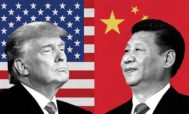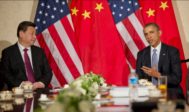Authors
Alexandra Viers

Alexandra Viers is a research associate and program manager with the China Power Project at CSIS, where she works on projects that pertain to Chinese foreign and security policy, US-China bilateral relations, and cross-strait relations. Prior to joining CSIS, she was an International Producer for The Cipher Brief, where she covered national security issues pertaining to Asia. Viers graduated with an M.A. in International Affairs from George Washington’s Elliott School of International Affairs in 2016. She received a B.A. in Global History and Chinese Language from Washington and Lee University.
Articles by Alexandra Viers

US - China
January — April 2017Trump and Xi Break the Ice at Mar-a-Lago
The US-China relationship got off to an active, albeit fitful start after Donald Trump assumed the presidency on Jan. 20. Once Trump agreed to honor the US “one China” policy, Chinese officials engaged positively with their US counterparts, and planning began for the inaugural Trump-Xi meeting. China’s top diplomat, Yang Jiechi, visited Washington at the end of February, and Secretary of State Rex Tillerson traveled to Beijing in mid-March. The highlight of this period was the Trump-Xi summit, which took place at Mar-a-Lago on April 6-7. One of the major summit deliverables was the creation of a new high-level mechanism, the US-China Comprehensive Dialogue, which will be overseen by Trump and Xi. North Korea emerged as the pressing issue for the Trump administration as well as in the bilateral US-China relationship. Trump apparently made clear to Xi that if China is unwilling to cooperate, the US would seek to solve the North Korea threat unilaterally, including by pursuing penalties against Chinese banks and companies doing business with North Korea. After the summit, Trump called Xi twice to discuss North Korea and to urge him to put greater pressure on Pyongyang.

US - China
September — December 2016China Prepares for Rocky Relations in 2017
Summits between Barack Obama and Xi Jinping in September and November helped to keep tensions in check in the last four months of 2016. Despite persisting differences over how much pressure to impose on North Korea after Pyongyang conducted its fifth nuclear test, the US and China agreed on a new UN Security Council sanctions resolution. The US Navy conducted another freedom of navigation operation (FONOP) near the Paracel Islands in the South China Sea. A Chinese Navy vessel snatched a US drone, claiming it was threatening the safety of the Chinese ship and its crew, and returned it to the US five days later. Incremental progress was made on trade disputes at the 27th annual US-China Joint Commission on Commerce and Trade (JCCT) in Washington, DC. Meanwhile, the election of Donald Trump as the next US president threatened to inject significant uncertainty into US-China relations as Trump received a phone call from Taiwan’s President Tsai Ing-wen and suggested that he might use Taiwan as a bargaining chip to extract concessions from China on other issues.
US - China
May — August 2016Friction and Cooperation Advance Simultaneously
Senior US and Chinese officials publicly emphasized positive developments in the bilateral relationship at the eighth US-China Strategic and Economic Dialogue, while privately raising concerns. The second US-China Cybercrime and Related Issues High-Level Joint Dialogue convened a week later. The South China Sea persisted as a major area of tension as an UNCLOS Tribunal ruled in favor of the Philippines in its case against China. National Security Adviser Susan Rice traveled to Beijing in late July to prepare for the US participation in the G20 Summit in Hangzhou and what is likely to be the last meeting between Xi Jinping and President Obama. Bilateral military ties maintained an active pace with a visit by the US chief of naval operations to China in July, a port visit by a US guided-missile destroyer to Qingdao in August, and Chinese participation in the Rim of the Pacific (RIMPAC) military exercises in Hawaii.
US - China
January — April 2016Navigating Friction, Forging Cooperation
The South China Sea remained the most contentious issue in the US-China relationship in the early months of 2016. North Korea’s fourth nuclear test and missile launches posed both a challenge and an opportunity. After two months of intense consultations, the US and China struck a deal that led to unprecedentedly tough sanctions on Pyongyang. Xi Jinping attended the Nuclear Security Summit in Washington DC at the end of March and met President Obama. Their joint statements called for cooperation on nuclear security and climate change. Relations between the militaries hit a snag as Secretary of Defense Ashton Carter postponed a planned visit to China and Beijing rejected a request for a US aircraft carrier battle group to visit Hong Kong. Talks continued on a bilateral investment treaty, but China failed to submit a new “negative list,” leaving prospects uncertain for concluding a BIT by the end of Obama’s term.